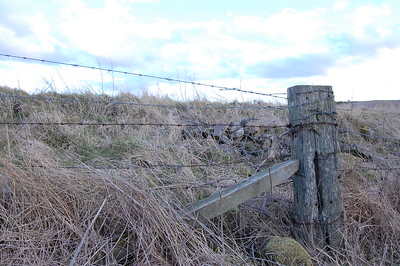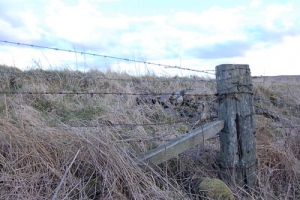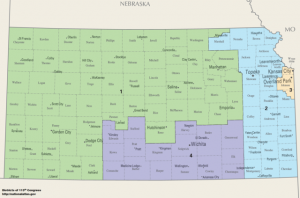 CC by 2.0
CC by 2.0Straddling the COVID-19 Barbed Wire Fence in Kansas

Pro Tip: Don’t sit on this fence. (photo h/t to Craig Simpson [CC BY 2.0])
The [KS] Senate voted 39-0 and the House 115-0 to approve a resolution to extend the state of emergency until May 1 and to allow legislative leaders to extend it further every 30 days. Kelly declared a state of emergency last week, and without the resolution, it would have expired March 27.
But the resolution also requires legislative leaders to review all of Kelly’s executive orders and allows them to overturn many of them within days. It also prohibits Kelly from having guns and ammunition seized or blocking their sale.
Conservatives in the Republican-controlled Legislature said Kelly overreached this month when she ordered public schools closed for the rest of the semester and complained that the state’s economy was being damaged too much. Legislative leaders have the power to revoke her orders related to the coronavirus pandemic.
Kansas House Speaker Ron Ryckman, Majority Leader Dan Hawkins and Speaker Pro Tem Blaine Finch, all Republicans, said in a joint statement that the new order “will no doubt impact our families and our businesses. As members of the Legislative Coordinating Council we have a duty to carefully assess this executive order and the reasons for it. Over the coming days we will consult with the Attorney General, health care professionals, the business community, and the state’s emergency management team to make sure we are on the right path.”
Kansas Senate President Susan Wagle, a Wichita Republican, said she was concerned about a “one size fits all” solution.
“I want to assure Kansans, particularly those in rural areas, the legislature is actively working to thoroughly review the Governor’s orders and ensure the specific needs of rural Kansans are addressed,” Wagle said in a statement.
[Note to the folks worried that the state’s economy was being damaged too much: a virus does not care.]
Speaking of those rural areas, let me direct your attention to OB-GYN Roger Marshall, who also serves as the US Representative from KS-01 (the large green area on the map to the right). Marshall is running to replace Pat Roberts in the US Senate, and he is trying to straddle a barbed wire fence on all this. He’s been loud about backing Trump’s “close the borders” stuff, but he’s still enough of a physician that he realizes that science actually matters. He doesn’t like the “big government” approach at all, but he has conspicuously not condemned Kelly for closing the schools. From an story two weeks ago in the Manhattan KS paper “The Mercury”:
Following Gov. Laura Kelly’s recent decision to close K-12 school buildings for the rest of the school year, halt mortgage foreclosures and evictions, and ban gatherings of more than 50 people, Marshall said he would rather people exercise an overabundance of caution at the moment.
“We have to assume that the virus is out in every community,” he said. “I hope there’s not, but we have to assume that. Kids and young adults, they’re super infectors so if one child has the virus, they’re going to transmit it a bunch more often than say an older person who just doesn’t have as many social contacts. Think of senior citizens, for the sake of people with illnesses.
“I hope in a couple of weeks you can say we did too much,” Marshall continued, “but I think right now, it’s so critical that this is the acceleration phase of the spread of this virus. Every virus we prevent spreading today is going to prevent dozens in the future and save many, many Kansas lives.”
Yesterday, Marshall retweeted John Hanna’s story about the Stay-At-Home order to his followers, perhaps trying to signal them that the GOP is watching this. He did not, however, attack or even question Kelly’s judgment for ordering this. To borrow from Sherlock Holmes, this is the dog that did not bark, and the silence is deafening.
And then there’s Marshall’s big opposition in the GOP primary (this was before Kelly’s order was issued yesterday):
U.S. Senate contender Kris Kobach reached for campaign gold amid the coronavirus pandemic by promising to intensify construction of a border wall to defend the country against illegal immigrants from China who may import deadly viruses.
“Over 12,000 Chinese nationals snuck across the border into the United States last year,” Kobach said in a video fundraising appeal delivered Thursday to potential voters in Kansas. “No checks. No visas. No health screening. In times of global pandemic, borders matter.”
The fence in Kansas between science and wingnuttery is made of very sharp barbed wire. Kobach is planted firmly on the Wingnuttery side of that fence, and Marshall does not want to cede all those voters to him by planting his feet firmly on the side of science. But Marshall is is going to find that straddling a barbed wire fence is not comfortable, to say the least.
The KS senate race will be very very interesting this November.




